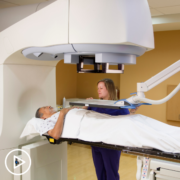Prostate Cancer Research: Updates From ASCO 2023
Prostate Cancer Research: Updates From ASCO 2023 from Patient Empowerment Network on Vimeo.
Expert Dr. Channing Paller shares prostate cancer research news, including updates on the PEACE-1 and STAMPEDE clinical trials, FDA treatment approvals, PARP inhibitors, PSMA-targeted imaging, and educational resources.
Channing Paller, MD is the Director of Prostate Cancer Clinical Research at Johns Hopkins Medicine. Learn more about this Dr. Paller.
See More From INSIST! Prostate Cancer
Related Resources

Updates in Prostate Cancer Treatment and Research | What You Need to Know Resource Guide |

|

|
Transcript:
Katherine:
Dr. Paller, in June, prostate cancer researchers from around the world met to discuss their findings at the annual American Society of Clinical Oncology, or ASCO meeting, in Chicago. Would you walk us through the highlights from that meeting that patients should know about?
Dr. Paller:
Absolutely.
We’ve had a exciting time for prostate cancer in June. So, I’d say, the first thing I would bring up is, the PEACE-1 trial was discussed again, and more data came out from that trial. That trial originally supported what we found, the STAMPEDE trial, to say, yes, we should add abiraterone (Zytiga) to androgen deprivation therapy and chemotherapy in helping de novo metastatic patients live longer and do better overall. And it also, this time around, showed us that combining abiraterone with radiation, plus or minus chemo, had patients do better. So, they had a longer progression-free survival, or metastasis-free survival.
And also, the neat thing was, patients had fewer local symptoms in the long run. So, it prevented catheters being needed later, prevented blockages. It prevented local side effects from their cancer, which was really terrific to know, because that helps with patients’ quality of life.
That was one of the main, personally. Go ahead.
Katherine:
Yeah, I was just going to ask, anything else?
Dr. Paller:
Yes. So, the second big headline, which is one of my dear loves, is all of the PARP inhibitor data. So, there were a couple trials presented, and this month has been terrific in terms of, there have been two drug approvals. So, let me talk through a couple of those.
So, one of the big ones that was presented at ASCO was looking at talazoparib (Talzenna) and enzalutamide (Xtandi) in patients with metastatic castration-resistant prostate cancer, and it showed that the combination of those two drugs helped patients do better than enzalutamide alone, in that setting. What was also interesting is a subset of patients with DNA repair mutations did even better.
June 20th, the FDA approved that combination for patients with metastatic castration-resistant prostate cancer with DNA repair mutations. (Lynparza) in the same space of metastatic castration-resistant prostate cancer for patients with BRCA mutations. That was a more narrow approval, but it was still very important.
And what’s exciting here is, we’re really learning more about targeted therapy, precision medicine, for our prostate cancer patients. When I started treating prostate cancer patients back in 2005, the main drug approved was chemotherapy, docetaxel (Taxotere), and hormone deprivation therapy. And in the last almost 20 years, or 18 years, we’ve had 10 drug approvals, and we’re really starting to have multiple drugs approved based on people’s genetics.
Katherine:
What is advanced prostate cancer? And is any of the research you mentioned focused on this stage of disease?
Dr. Paller:
Well, advanced prostate cancer includes any prostate cancer that was extended outside the prostate, really, that’s spread to the nodes, even to the lymph nodes, to the liver, to the lungs, to the bones. And so, we have a lot of new findings, looking at this space, and that was a lot of what they showed at the ASCO conference.
The other thing we’re learning is that we really want to get genetic testing on everybody. And so, in addition to your regular, “How do you feel?” “What do your labs show?” “What is your PSA doing?”
We also want to get imaging, right? So, we want to look at imaging, in terms of, what did your CT and bone scan show? And nowadays, we’re moving into PSMA, or prostate-specific membrane antigen, PET scans.
And so, that’s the new main way people look at where their prostate cancer has gone, and help them decide, what is the best treatment for me? Is it to get surgery locally, or has it advanced now, and I really need to do hormone therapy and radiation, or some other combination of systemic therapy, meaning more hormones, or more chemotherapy, with targeted therapies such as radiation?
Katherine:
Beyond ASCO, Dr. Paller, are there other research or treatment advances that patients should know about? Anything other than what you’ve mentioned already?
Dr. Paller:
Oh, yes. So, the other headline that I was really excited about at ASCO is watching medicine adopt the world of artificial intelligence. There was a great abstract, looking at how we can use artificial intelligence to look up pathology slides.
So, in the past, we would always want to go to a top academic center to have your pathology reviewed by a top expert and make sure we were treating the right cancer, and make sure we really understand your risk. What we’re finding is, we can create biomarkers, and we’re understanding not just genetic, genomic biomarkers, but also pathology biomarkers, and age, and PSA, and risk, and comorbidities, and we can combine them all together and use AI to help us better stratify patients.
And so, although it’s early, I think this is going to be an explosion in terms of helping us better define risk for patients in advanced prostate cancer, and help them figure out, do they need intensification of treatment, or can we de-intensify treatment? Can we not cause as much toxicity, and they’ll do just as well? And so, I was really excited to see that data as well.
Katherine:
How can patients stay up to date on evolving research?
Dr. Paller:
There are many ways to stay up to date. There are nice summaries at ASCO. There are nice summaries through the Prostate Cancer Foundation. There are good summaries at each of the institutions with whom you work.
One of my favorite ways to stay up to date on precision medicine is one of these registries that I am co-leading, which is called the PROMISE registry. This is a wonderful opportunity which was conceived in the pandemic.
And so, it’s pandemic friendly, and that is called the PROMISE registry. And what you can do is go to prostatecancerpromise.org and sign up if you have prostate cancer. And you say, “Hey, I have prostate cancer. This is my address. Please ship me a kit where I can do saliva testing of my genes.” And once you get your tests sent in, they’ll send you a kit, you send it back, you’ll get an email, and you can go over your results with a genetic counselor.
And then, once you get enrolled in this program, it is really just a free information source. And so, you can learn more about the clinical trials around the country for patients with different mutations. And so, I love that as, whether or not you have a mutation and you’re going to follow with us for 20 years, because we’re going to offer you opportunities and let you be the first to know about new drug approvals, you can still hear about all of the new research.
And I think that’s a wonderful, free resource that we’ve done for our patients to help them understand more about what’s out there. Another opportunity to learn more about prostate cancer is the prostate cancer clinical trial consortium. They have a nice website looking at germline genetics, looking at diversity, looking about clinical trial design. And so, there’s lots of different places to learn more about prostate cancer.









